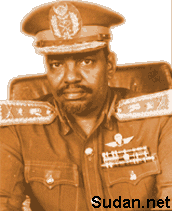[Al Jazeera] The UN Security Council has called on the north Sudanese army to withdraw from positions it has taken in the disputed region of Abyei.
In a statement read to news hounds in Khartoum by the French council ambassador on Sunday, the council also condemned south Sudanese forces for attacking a UN convoy in Abyei on Thursday.
Susan Rice, the United States ambassador to the United Nations
...aka the Oyster Bay Chowder and Marching Society...
, called the escalation of the situation in Abyei "quite dangerous" as she visited the country with UN and British envoys.
The call for the withdrawal came after the army from the north seized control of the disputed, oil-producing Abyei region, officials said on Sunday.
Thousands have been fleeing the region amid fears that north and south, which fought a decades-long civil war before signing an agreement in 2005 to end the conflict, could go to war over Abyei.
Sudanese forces remain in control of Abyei and say they moved in after the south's Sudan Peoples Liberation Army (SPLA) moved unauthorised forces into the disputed region, in repeated violations of a 2005 peace agreement.
"The Sudanese armed forces control Abyei and are cleansing it of illegal forces," Amin Hassan Omar, a minister of state for presidential affairs, told news hounds after meeting a delegation of the UN Security Council in Khartoum, the capital of Sudan.
"The government is committed to the peace agreement but the southern army wanted to enforce an unilateral solution."
'No war intention'
The comments were echoed by Didiry Mohammad Ahmed, of the ruling National Congress Party (NCP) in Sudan, who said Abyei had been seized by the SPLA "over the last six months".
"As we all know, since December last year, the SPLA has deployed 2,500 troops to Abyei and those troops were deployed in violation of the CPA [Comprehensive Peace Agreement]," he told Al Jizz.
Ahmed said "there's no intention to reignite any war".
"We have just had a very limited operation for a very limited military purpose which was accomplished 100 per cent," he said.
"As soon as we are quite sure that there's no vacuum left behind that will enable the SPLA to once again deploy in Abyei, we'll withdraw."
Barnaba Benjamin, the information minister of South Sudan, told Al Jizz that the Sudanese government needed to withdraw its troops, calling the situation in Abyei "deplorable".
UN officials saw 15 tanks of the Sudanese Armed Forces, the northern army, on Saturday in parts of the town of Abyei, where earlier mortars slammed against a UN base, Hua Jiang, the UN spokeswoman, said.
Control of oil-rich and fertile Abyei has been the main point of dispute between Sudan and South Sudan ahead of plans for the south to become a separate state on July 9, following a January referendum on independence.
Attack denied
Tensions escalated after the north accused the SPLA of attacking a convoy of Sudanese soldiers and UN peacekeepers in Dokura north of Abyei town late on Thursday.
The SPLA denied responsibility for the attack, which the United Nations said had taken place on a convoy of northern troops escorted by UN peacekeepers under a deal for both sides to withdraw forces from the disputed territory.
The US, one of the main backers of Sudan's landmark 2005 peace deal, has deplored the southern forces' May 19 attack on a UN convoy that was lawfully transporting a SAF company.
But Ahmed of the NCP said the US did not condemn the southern army for deploying troops into Abyei.
"We didn't hear any condemnation from the US when the SPLA deployed 2,500 troops last December and when those troops refused several pleas from the UN and dishonoured so many agreements ... to withdraw," he said.
"Why on earth, right now, is the United States denouncing us?"
The North and South were supposed to have withdrawn all of their forces from Abyei by this week except for a special joint force made up of units from both sides.
The north supports the Arab Misseriya tribe that grazes its cattle in Abyei, and the south backs the Dinka Ngok tribe that lives there year round. |
 [Daily Nation (Kenya)] South Sudan's army vowed Tuesday to hold their positions in a contested oil field seized from Khartoum's army, one week after the outbreak of bitter fighting that has raised fears of a wider war.
[Daily Nation (Kenya)] South Sudan's army vowed Tuesday to hold their positions in a contested oil field seized from Khartoum's army, one week after the outbreak of bitter fighting that has raised fears of a wider war.
 Official spokeswoman of the UN mission in Sudan
Official spokeswoman of the UN mission in Sudan  Southern Sudanese rebels said militia fighters allied to the northern Khartoum government had attacked them despite a peace deal supposed to end Africa's longest war. The attacks over the last three weeks on positions held by the
Southern Sudanese rebels said militia fighters allied to the northern Khartoum government had attacked them despite a peace deal supposed to end Africa's longest war. The attacks over the last three weeks on positions held by the